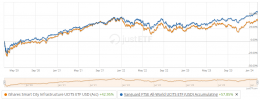The reality is that most life insurance companies charge more than 1% AMC, for my child saving account Zurich is charging me 1.25% which is A LOT. At the time, I was fully aware of the potentially of investing into passive funds.Fees are based on 1% amc.
If you are paying for tax out of your own pocket, you are saving more than €400 a month then as you are always going to be saving future tax costs.
It's not for everyone. The most cost efficient way of doing anything is to do it yourself. Lots of people are happy to outsource and then spend their time doing other things they enjoy while someone else is looking after the admin and taxes for them.
I just recently became aware of the way the deemed disposal tax is paid by life insurance companies, which in effect negates compounding. In an ideal world, customers should be given the option to pay for it with their cash if they wish. After all, Revenue will still get their money.
The realty is that it is done that way to hinder anyone who wants to invest in non-conventional ways (aka property investing etc.)
The complexity of computing deemed disposal tax and the exit tax is just overstating. In this very same thread, you saw how people came up with simple spreadsheet to do just that.
If you are investing in accumulating Irish domiciled ETFs you don't even have to report anything to Revenue until either you decide to cash in or the deemed disposal tax is due. In addition, they're several online platforms that makes investing in passive funds so easy that you wonder why life insurance companies are charging so much.
The amount of work involved is simply not too much to outsource and especially for that fee. Right now, I can barely see the point in investing in those companies given that the returns over the long term won't be as good as a passive index. As you said in your post entitled: 'A snap shot of the highs and lows of investing', investing is easy and I would add that passive investing is easier than active investing.
This is not me ranting about being ripped off by life insurance companies but just pointing out the facts.

